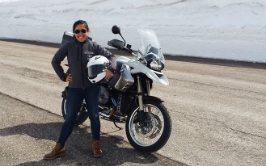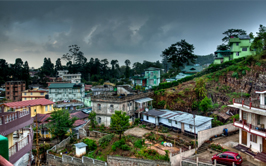
What would you do if you are 14, lying in a deep comatose on a hospital bed, and the doctor declares you dead while your mother is planning your birthday party just four days away? Such is the story of Virali Modi, who was diagnosed with a medical condition that left her wheelchair-bound at that tender age.
Yet, it has not stopped her one bit. The runner-up in the Miss India Wheelchair 2014 pageant is a passionate wordsmith who has been nominated as a Top Quora writer, and is actively pursuing her modelling dream. An ardent traveller, she feeds her wanderlust with frequent trips (she’s currently on holiday in Atlanta, USA). Virali tells us about her love for seeing the world, shares her tips for fellow women travellers, and opens up about the challenges she has to overcome as a woman on wheels.
Tell us about yourself and your condition.
Virali Modi: The best word that describes me is probably ‘survivor.’ At the age of 14, I survived death three times in a 23-day period. My family and I were living in Pennsylvania, USA at that time and had just returned from a visit to India. I contracted a very high fever and the next thing I knew, I was in the hospital with a million tubes sticking out of my body. Doctors call my condition Transverse Myelitis – an inflammation in the spinal cord that affects all areas below the injury. The condition has left me wheelchair-bound since then. The morbid stuff aside, I am a published writer, motivational speaker, and model. Currently I am living in Mumbai, India with my parents who are my biggest support system.
You were a finalist in the Miss Wheelchair India pageant. What was the experience like?
VM: Like every other girl, being selected for the Miss India Wheelchair contest got me quite excited and I did everything to look my very best and be as presentable as possible – from fancy facials to painful waxing, smiling into the cameras and selecting the correct outfit to reading up on politics (blah!). I had a great time with the other contestants and all the backstage prep; it’s not every day that you get dolled up by professional stylists!
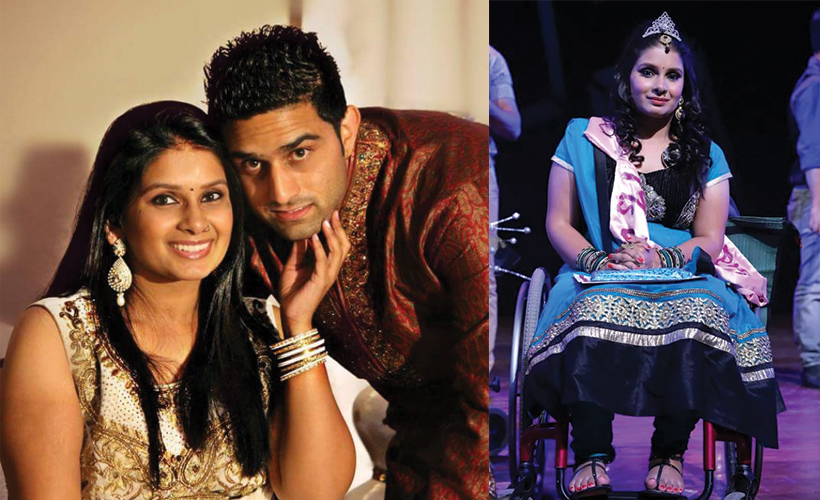
What the pageant gave me was a renewed self-confidence and a chance to meet others who, like me, sit on a wheelchair but have aspirations that touch the sky. It also provided exposure to other models and industry bigwigs who might one day help me realise my dreams.
You have not let your condition stop you from travelling. Where has your wheelchair taken you?
VM: I travel a lot! I suffer from something called wanderlust and it wreaks havoc on my bank account! I’m originally from the USA, so I need to start there.
I’ve been to approximately 32 states within inland USA, and still dream of going to Hawaii and Alaska.
I’ve been to two provinces in Canada, including Toronto and Niagara Falls. I visited Africa last year, when I went to Harare, Zimbabwe for my boyfriend’s sister’s wedding.
I’ve travelled through 14 countries in Europe, though that was before my disability.
Within India I’ve visited several states including Maharashtra, Rajasthan, Gujarat, and Delhi.
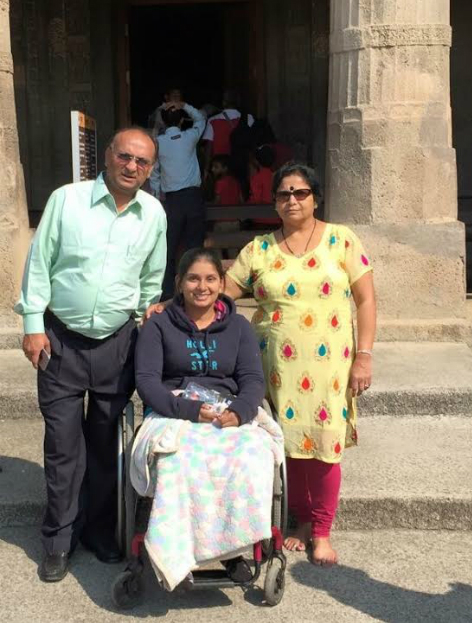
It can’t be easy for you…
VM: Being a woman and travelling on a wheelchair is definitely very challenging; unfortunately there aren’t a lot of things or places that are wheelchair-friendly. I travel because my disability shouldn’t be a limiting factor in my life. It’s unfortunate and it happened and well, I can’t keep feeling sorry for myself. I love adventure and a good challenge. What’s more challenging than travelling with a disability?
What are the most common difficulties you face as a traveller?
VM: Finding an accessible washroom where my wheelchair can fit through the stalls. It usually isn’t a problem at hotels, but public washrooms are a different story. I have started to use a catheter for my urinary issues but it’s still an inconvenience while travelling.
Another obstacle is that most places have an abundance of stairs and it’s impossible to be independent. Usually if people see me struggling, they’ll help me up or down the stairs. Sadly, that’s the only way to move about.
Which are the most and least wheelchair friendly cities you have visited?
VM: Quite sadly, Mumbai, my home city, has been the least wheelchair friendly city I have been to. The roads are bad and using public transportation is a horror. I find Toronto to be the most wheelchair friendly city. They have slopes and ramps everywhere, making it easy for me to move about.
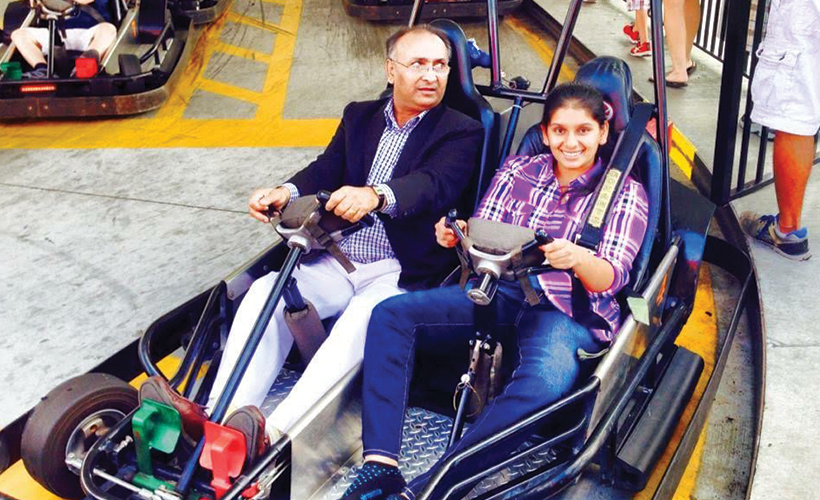
Generally speaking, how disabled-friendly would you say India is and how do you think that can be improved?
VM: India is definitely trying to improve its infrastructure by incorporating ramps and elevators in private, government, and commercial buildings, but I think it needs to go beyond that. There are potholes in the streets and cobblestone roads that make it difficult to propel a wheelchair, but the biggest thing that needs to change is the general outlook towards people with disabilities. I often feel that being an invalid has involuntarily made me a segregated section of society. Most people have the misconception that people on wheelchairs are always in need of sympathy. On the contrary, I am perfectly fine alone and don’t need to be helped every time unless I ask for it. Spreading awareness about disability would be a good step toward making the society more accepting to us.
How do you plan your trips?
VM: Honestly, I’ve given up planning my trips because they never go according to plan! I’ve decided to just go with the flow and face each challenge as it comes. Nevertheless, there are some things that I do look up before I embark on my journeys:
Studying and identifying practical destinations – It’s important to know how to go there and what happens once I arrive there. If there is something with 200 steps and no elevators or ramps, for example, it would be a serious imposition on me.
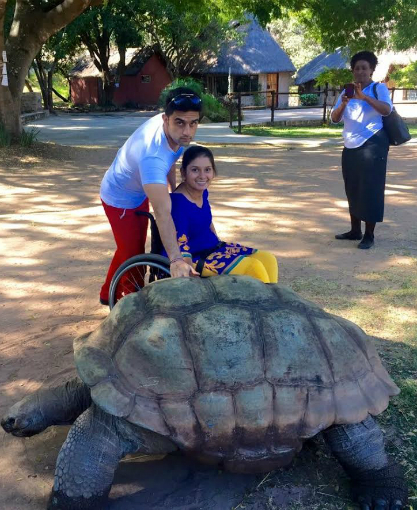
Preparing myself for air travel – This is the most challenging part of a journey for me. Due to my condition, I feel extreme temperatures so airports and airplanes are like walk-in freezers for me. Before I board a flight, I usually dress in 2-3 layers of clothes. I will wear woolen leggings and warm socks under my jeans, and put on a bulky sweatshirt over my t-shirt. I also make it a point to be the first one to board the flight so that the staff can accommodate me without causing inconvenience to the other passengers.
Finding suitable hotels – I usually call up beforehand to explain to the hotel staff about my condition, and to check on what facilities are available.
Selecting my travel companion – I cannot travel solo and have to be sure that I have someone with me whom I can rely upon. During most of my travels, I am accompanied by either my parents or my partner. All of them are aware of my medical background and history, so it becomes much easier for me to reach out to them in case I feel any discomfort.
What are the most important things we should know about travelling with or helping someone who is in a wheelchair?
VM: Just because the person is in a wheelchair, don’t assume they need your help. If you see them struggling offer to help as a gesture of courtesy and not sympathy. Also, different wheelchairs have different operational specifications. Ask the person on the wheelchair how best you can handle it.
There are certain reservations in public washrooms, parking lots, elevators and other places that are meant for disabled individuals. Be considerate toward those and do not use those spaces unless you are accompanied by someone on a wheelchair. In case of a serious event, where you see a disabled individual having a seizure, becoming unconsciousness or bleeding, do not hesitate to call for immediate medical help. And last but not least, look beyond the chair, there is a person in front of you, not a disability!
Have you had any bad experiences while travelling?
VM: The worst was in 2008 when I was travelling to Delhi with my mom to an Ayurvedic treatment facility. We were unable to book flight tickets and so decided to take the public train. The nightmare started when I arrived at the station and realised that the only wheelchair ramp available had huge holes. Somehow, my mother managed to get me up and we moved towards the waiting train. The steps to reach the train were very high and there was no ramp that I could use. While I looked and hoped for a detachable board to be present somewhere, my mother looked around for an alternative solution.
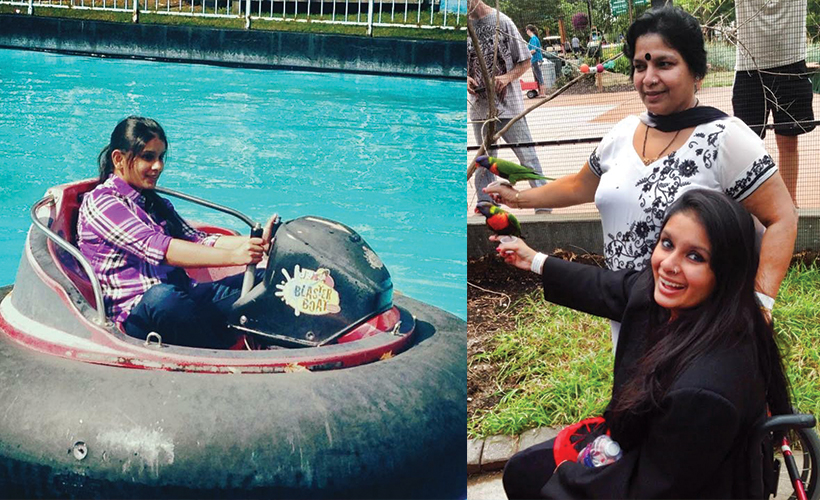
Finally, my mom convinced two luggage porters to lift me and drop me to my seat. She agreed to pay them an extra amount of money. Horror struck me as two weird, sweaty men lifted me from under my armpits and carried me up into the train while everyone at the station simply stared. If that wasn’t bad enough, one of the men kept touching my breasts, and elbowed them a couple times – that was my first encounter of something close to a sexual assault. I was embarrassed, scared and my eyes brimmed with tears. The entire experience left me feeling awful and disgusting!
What are your best travel tips for women with disabilities?
VM: My number one advice is: Always travel with someone you are comfortable with.
Take special care of your hygiene; you don’t want to have an infection on the road. Depending on your condition, carry extra medications and prescriptions.
Find out where the wheelchair repair shops or bicycle repair shops are in the event of problems with your wheels.
Most of all, savour each moment of your trip, even the difficult parts. I know it’s a stretch to say enjoy having someone lift you up but when you get home, you’ll have some killer stories to tell!
If you have any questions for Virali or would like to know more about her life story and her experiences, you can connect with her on Facebook and Quora.
![]()


